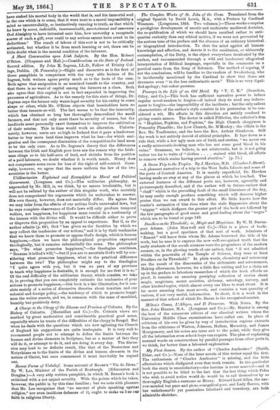A Short Conversation upon Irish Subjects. By the Hon. Robert
O'Brien. (Chapman and Hall.)—Consideratkins on the State of Ireland. Second edition. By John K. Ingram, LL.D., Fellow of Trinity Col- lege, Dublin. (E. Ponsonby.)—Slight and discursive as is the first of these pamphlets in comparison with the very able lecture of Dr. Ingram, both writers agree pretty much as to the facts of the case. Both agree that emigration is an unmixed benefit to the country, and that there is no want of capital among the farmers as a class. Both Also agree that this capital is not in fact expended in improving the processes of agriculture. As to the remedy for this state of things, Dr. Ingram says the farmer only wants legal security for his outlay in some shape or other, while Mr. O'Brien objects that leaseholders farm no better than tenants-at-will. The fact seems to be that the insecurity, which has obtained so long has thoroughly demoralized the small farmers, and that not only must there be security of tenure, but the landlords must personally exert themselves to improve the cultivation of their estates. This in time would work an alteration. Unfortu- nately, however, rents are so high in Ireland that it pays a landowner better to buy more land than improve what he has—for which emi- gration and the consequent diminution of the competition for land seem to be the only cure. As to Dr. Ingram's theory that the differences between the Irish and English poor laws are the reason why the Irish- man clings so to his half-acre of land, and shrinks from the position of a paid labourer, we doubt whether it is worth much. Money does not compensate some races for loss of the right of self-controL Gene- rally, however, we agree that the more uniform the law of the two countries is the better.
































 Previous page
Previous page